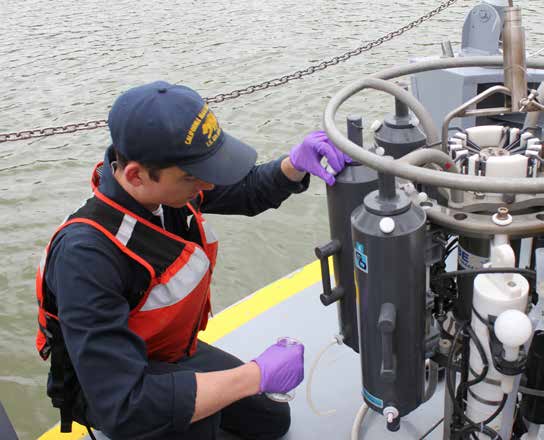New Opportunities
Marine Science Marks Milestone Anniversary with Continued Growth, New Opportunities

In 1976, Cal Maritime introduced Ocean Technology as one of several concentrations
of courses that students could take to broaden and enhance their educational experience.
These concentrations of courses were known as "options." At that point, only a handful
of elective classes were available at the Academy, and students who completed one
of the optional concentration areas received a notation on their official transcript.
|
|
By 1983, the Ocean Technology option had evolved into a full-blown minor, now known as Marine Science. The minor operated under the direction of Professor Lloyd Kitazono, who taught at Cal Maritime from 1978 until 2013.
"This change was done at a time when the Academy was developing other majors, and the administration and faculty realized that minors were more common and recognizable than just something called ‘options,'" remembered Kitazono. "The Ocean Technology option and, later the Marine
Science minor, were developed so that students with a serious interest in marine sciences could take such courses, complete a culminating project, and graduate with knowledge and skills that could enhance opportunities for employment or graduate studies."
In the fall of 2013, Dr. Alex Parker joined the faculty at Cal Maritime from San Francisco State University. Dr. Parker is a biological oceanographer with extensive field research and a record of scholarship. He is a member of the Central and Northern California Ocean Observing System (CeNCOOS) governing council, part of a national ocean observing network.
In the spring of 2016, the first life science laboratory course was offered – marine biology laboratory. A year earlier an Oceanography Club launched – offering opportunities for field trips and on-campus events. New directed research and undergraduate research support from the California State University Council on Ocean Affairs, Science & Technology (COAST) started in 2014 – awarding more than $12,000 in funding for independent marine science and related projects. As it celebrates its fortieth anniversary on campus, the program enjoys recently-renovated research lab spaces, the acquisition of new state-of-the-art equipment, and – beginning in 2017 – Marine Science students and faculty will conduct regular surveys of the Bay in partnership with the Marine Transportation Department's navigation and piloting class.
Cal Maritime's Marine Science students make regular surveys of the water conditions in San Francisco Bay and Cal Maritime is a member organization in the CeNCOOS network.
These days the core of the minor classes are in physical, biological, chemical and geological oceanography and marine biology. A hands-on course in oceanographic instrumentation and analysis is also offered – exposing cadets to modern methods in oceanography research. All of the marine science courses stress "ocean literacy", giving students not only information about ocean principles, but also the tools to effectively communicate complex scientific concepts and knowledge to make informed responsible decisions about ocean stewardship.
Students' culminating projects have run the gamut, from research projects to the construction of miniature Remotely Operated Vehicles (ROVs). Graduates with the minor have gone on to graduate schools – including law school. Some have gone on to employment on research vessels, at the Monterey Bay Aquarium, and even the U.S. Navy Research Program with Marine Mammals.
"Students from all majors participate in the minor program," said Dr. Parker. "And Marine Science is gaining in popularity on campus – with an expanding number of courses, an undergraduate research program, and the oceanography club."
"The program continues to develop," said Dr. Parker. "We are modernizing the curriculum to include even more hands-on research, taking advantage of the campus waterfront location and our fleet of vessels. We also plan to bring even more marine science employers to campus to meet our students and witness firsthand the training that they receive."

